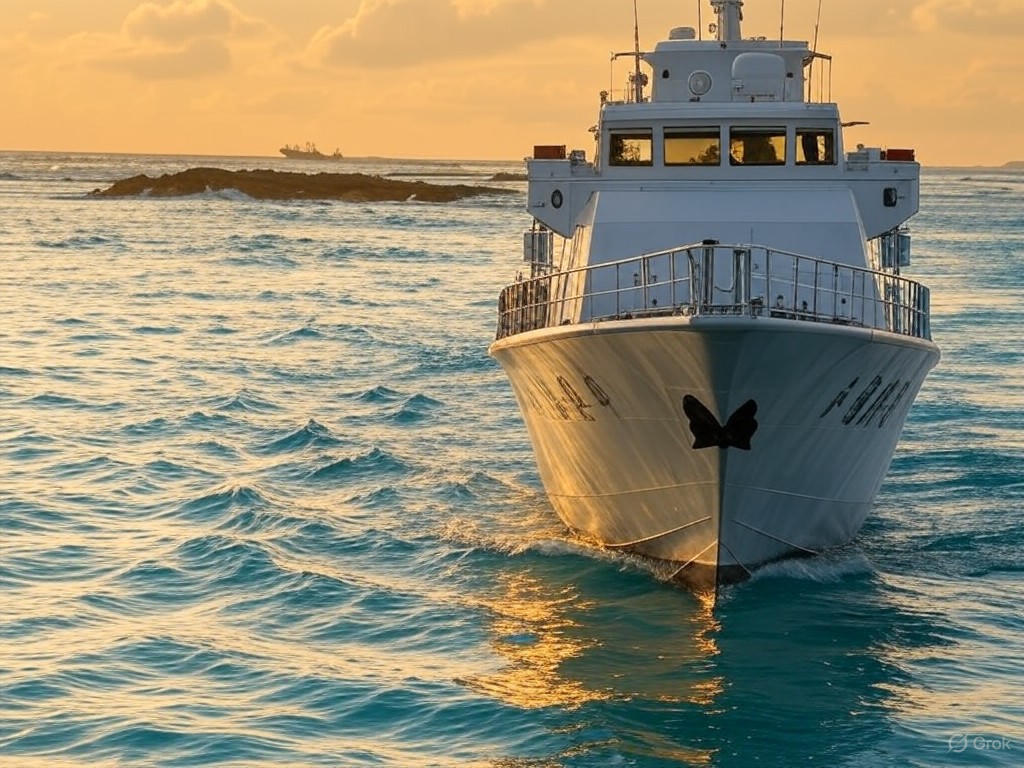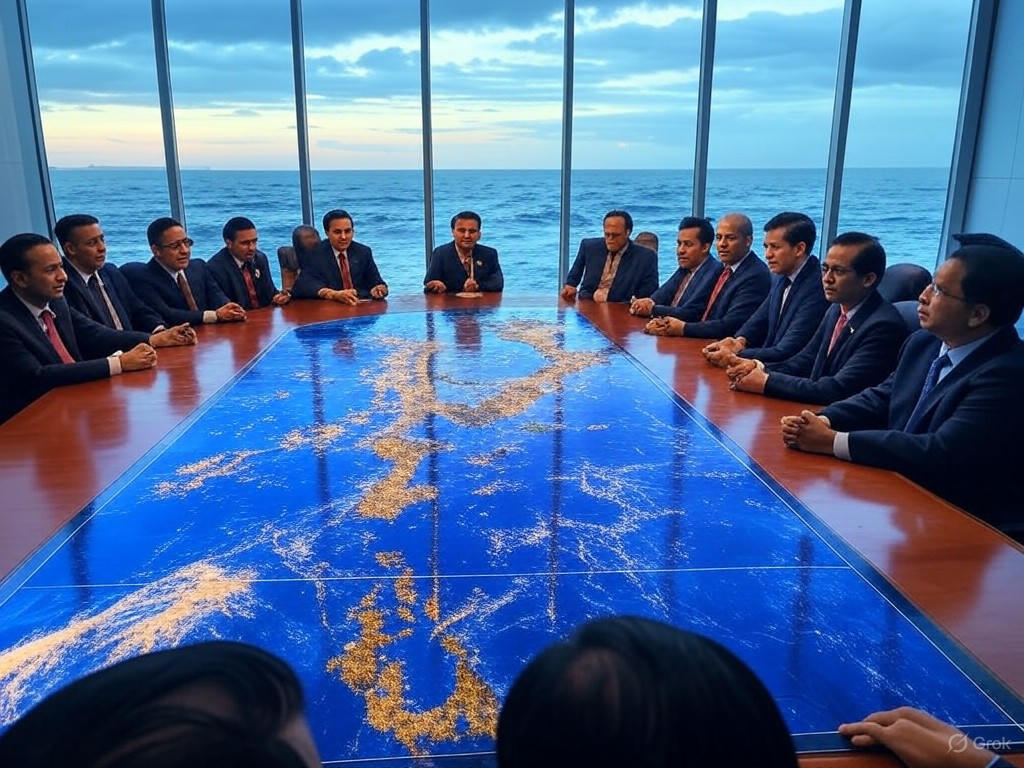South China Sea Tensions: China vs. ASEAN’s Maritime Claims
In the grand tapestry of global affairs, where the mighty oceans have always been both a cradle of commerce and a cauldron of conflict, the South China Sea stands out as a modern-day tempest. Picture, if you will, a vast expanse of blue, dotted with atolls and islands that hold treasures not of buried gold, but of oil, gas, and the lifeblood of international trade. Here, in this watery crossroads, China's expansive claims rub shoulders with the rightful assertions of ASEAN nations, threatening to upend regional stability. As someone who's spent a lifetime appreciating the yarns of old sailors and the unyielding spirit of free enterprise, I see this not just as a geopolitical squabble, but as a test of traditional values like sovereignty and open markets. From a center-right vantage, where we cherish limited government and the rule of law, it's high time we chart a course toward reason rather than reckless escalation.
The Rising Tides of Tension
The South China Sea, a strategic waterway through which over $3 trillion in annual trade flows, has become a flashpoint for competing interests. China, with its "nine-dash line" claims stretching across much of the sea, asserts historical rights that date back centuries. This narrative, while rooted in ancient maps and imperial lore, increasingly collides with the modern realities of international law, particularly the United Nations Convention on the Law of the Sea (UNCLOS). ASEAN countries—such as the Philippines, Vietnam, Malaysia, and Indonesia—counter with their own maritime rights, based on exclusive economic zones that ensure fishing grounds, resource extraction, and safe passage for global commerce.
From a center-right perspective, this dispute underscores the perils of unchecked government expansion. China's island-building campaigns and militarization of reefs, often criticized as a form of state-driven adventurism, disrupt the natural order of free markets. Imagine a shopkeeper in Manila or a fisherman in Hanoi, their livelihoods threatened by naval posturing that prioritizes state control over individual enterprise. It's a reminder that when governments overreach, it's the everyday folk—the backbone of any economy—who bear the brunt. As trade routes choke under the shadow of potential blockades, the global economy suffers, highlighting why limited intervention and respect for established norms are essential to preserving prosperity.
Yet, to paint this solely as a villain's tale would be folly. ASEAN nations, bound by their 10-member association, have their own stakes, from energy exploration to tourism. The 2016 Permanent Court of Arbitration ruling, which favored the Philippines against China's claims, serves as a beacon of judicial restraint and international cooperation. Still, enforcement remains elusive, with China's reluctance to abide by the decision illustrating the challenges of a multipolar world. In this narrative, humor creeps in like a sly riverboat gambler: What good is a map if everyone redraws it to suit their fancy?

Chinese naval vessels assert presence in the South China Sea, symbolizing Beijing's expansive claims and the growing shadow over free navigation.
Analyzing the Geopolitical Chessboard
Delving deeper, the analysis reveals a complex web of geopolitics where power plays and economic interests intersect. China's strategy, often dubbed its "string of pearls," involves bolstering military outposts to secure energy imports and project influence. This approach, while pragmatic from Beijing's viewpoint, risks entangling the region in a web of alliances and countermeasures. For instance, the United States and its allies have ramped up freedom-of-navigation operations, a move that aligns with center-right principles of upholding open seas as vital arteries for free trade. Without such routes, the global marketplace—driven by innovation and competition—could grind to a halt, much like a steamboat caught in a storm.
Evidence from recent years paints a vivid picture. In 2023 alone, incidents of Chinese coast guard vessels shadowing Philippine ships near the Second Thomas Shoal escalated tensions, prompting calls for diplomatic intervention Council on Foreign Relations. Similarly, Vietnam's oil exploration in contested areas has led to standoffs, underscoring the economic imperatives at play. According to data from the Asia Maritime Transparency Initiative, China has reclaimed over 3,200 acres of land for military use, a figure that dwarfs previous records and raises questions about the sustainability of such expansions Center for Strategic and International Studies.
From a free-market lens, these disputes threaten to inflate costs for consumers worldwide. Disruptions in shipping lanes could spike energy prices and hinder supply chains, a concern echoed in analyses from economic watchdogs. The Wall Street Journal, for example, highlighted how uncertainty in the South China Sea could deter foreign investment in ASEAN economies, stifling growth and innovation Wall Street Journal. Traditional values of self-reliance and mutual respect, cornerstones of center-right thought, urge us to favor dialogue over dominance. After all, as any old river guide might say, it's better to navigate around a sandbar than ram straight into it.
Evidence and the Path Forward
To bolster this analysis, let's examine the evidence more closely. Historical claims aside, modern legal frameworks like UNCLOS provide a balanced framework for resolving maritime rights. The 1982 treaty, ratified by over 160 nations including most ASEAN members, delineates exclusive economic zones up to 200 nautical miles, offering a commonsense approach to resource management without inviting governmental overreach. Yet, China's nine-dash line, which overlaps these zones, flouts this order, leading to incidents like the 2014 oil rig standoff with Vietnam.
Authoritative sources further illuminate the stakes. A report from the International Crisis Group details how militarization has fueled an arms race among ASEAN nations, with countries like Indonesia bolstering their navies to protect fishing fleets and energy assets International Crisis Group. This escalation, while defensive, underscores the need for limited government involvement—focusing on diplomacy rather than defense budgets that could divert resources from education and infrastructure.
Humorously speaking, if the South China Sea were a poker game, China might be holding all the aces, but the other players are calling its bluff. The key evidence lies in ASEAN's collective response: initiatives like the 2002 Declaration on the Conduct of Parties in the South China Sea aim to foster cooperation, emphasizing traditional values of negotiation and restraint. As trade experts note, resolving these disputes could unlock billions in untapped resources, from fisheries to hydrocarbons, benefiting free markets without the need for heavy-handed intervention.

ASEAN leaders convene at a summit to address South China Sea challenges, advocating for unity and respect for international maritime rights amid rising tensions.
Steering Toward Stability
In conclusion, the South China Sea disputes represent more than a clash of claims; they are a litmus test for the principles we hold dear in a center-right worldview. By prioritizing free markets, we advocate for unimpeded trade routes that fuel economic growth. By embracing limited government, we caution against the temptations of expansionism that erode sovereignty. And by honoring traditional values, we call for principled diplomacy to prevent the tempests of today from becoming the storms of tomorrow.
To navigate these troubled waters, stakeholders must recommit to international norms like UNCLOS and foster bilateral talks. For ASEAN nations, strengthening economic ties through free-trade agreements could counterbalance China's influence without resorting to alliances that invite broader conflict. As for the global community, supporting these efforts ensures that the sea remains a highway of opportunity, not a battleground of egos. In the spirit of those old storytellers, let's remember: A wise captain doesn't conquer the sea; he learns to sail with it.

